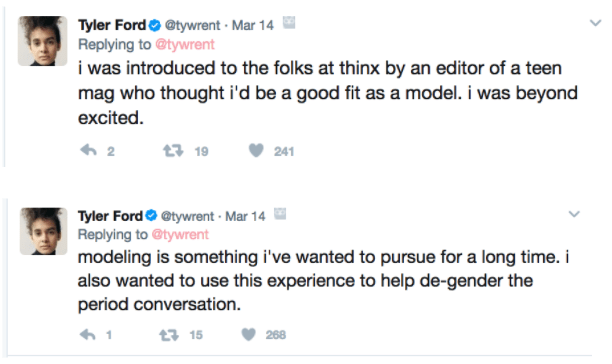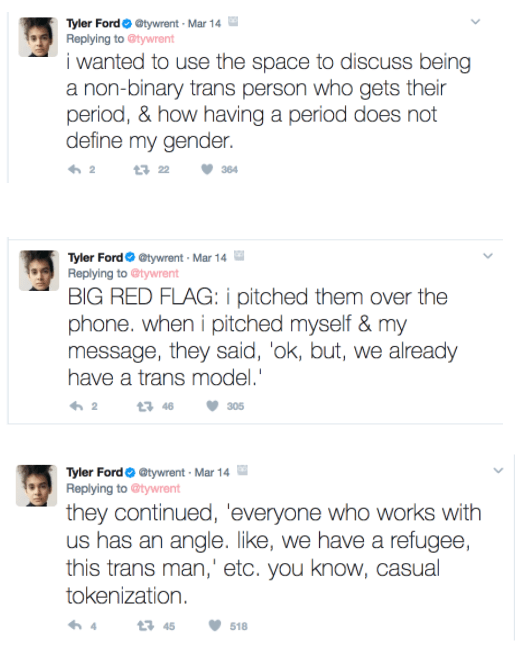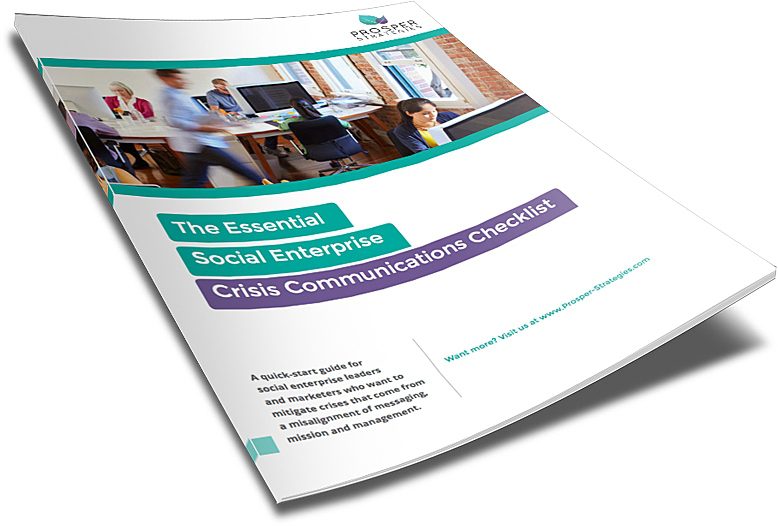What happens when it becomes clear that a social enterprise’s mission and messaging are totally misaligned with its management?
What happens, at least if you’re the purportedly pro-feminist period-proof underwear company THINX, is that all Hell breaks loose.
Last month, THINX co-founder Miki Agrawal stepped down from her role as the company’s CEO amid a slew of negative Glassdoor reviews about her management style and the reported departure of at least 10 of the company’s employees over the course of one month.
Then, what was already a bad situation internally became a full-fledged external communications crisis. Days after Agrawal’s departure, the media caught wind of a complaint filed with the New York Commission of Human Rights by a former employee (who, ironically, used to run PR for THINX) accusing Agrawal of sexual harassment. Several of the employee’s former colleagues quickly backed up the legitimacy of her claims and made more of their own. In addition to allegedly touching employees’ breasts and taking video conference calls while naked in bed, current and past THINX staff accused Agrawal of unfair salary negotiation practices and claimed the only employees known to have ever successfully negotiated a higher salary were two of the company’s few white male staff members. They also aired grievances about the THINX’s insufficient paternity leave policy (only two weeks of paid leave for the birthing parent), impossible-to-afford health insurance and general mistreatment.
The complaints weren’t limited to THINX staff, either. Hours after the story about the sexual harassment complaint broke, Tyler Ford, a non-binary trans model, posted a series of tweets that, like the employee complaints, illustrated just how out of sync THINX’s stated mission and its management really were. Here are a few of them:


Yikes.
Now, THINX isn’t the only trendy and buzzed-about company to find itself in the midst of a major HR, PR and values crisis. Amazon, Uber and Yahoo! Have all come under fire for things like employee mistreatment, sexual harassment and poorly received paternal leave policies.
But what makes this situation so different isn’t, as many people are saying, the fact that Agrawal is a female leader. It’s the fact that THINX is a social enterprise.
In addition to their pro-feminist positioning, THINX recently launched a foundation focused on empowering girls around the world by giving them a safe space to learn about only their bodies and menstruation, but also self-defense, financial literacy and entrepreneurship. Before that, THINX operated with a giveback model in which they donated a portion of sales to AFRIpads, an organization that seeks to empower African women by removing the barrier of menstruation.
These are worthwhile, important efforts that illustrate exactly what a social enterprise should be, even if Agrawal’s behavior did the exact opposite. It’s THINX’s legitimate impact as a social enterprise that makes me so want to see the company overcome its recent challenges and go on to succeed. But it’s also the company’s social enterprise status that will make it so much more difficult for THINX to overcome their crisis than it was for companies like Amazon and Uber to overcome theirs.
I keep asking myself, can great PR save a social enterprise like THINX from its crisis of misaligned management, messaging and mission?[bctt tweet=”Can great PR save a social enterprise like @sheTHINX from a crisis of misaligned management, messaging and mission?” via=”no”]
I think it can, but if and only if some very specific criteria are met and important actions are taken now, before it’s too late. Here’s my unsolicited advice to THINX, as a female business owner, a PR professional who works with social enterprises, and someone who cares deeply about these issues, about what they should do now from a crisis communication perspective.
Address the issues head-on
Since the situation with Agrawal began to spin out of control, THINX has been trying their hardest to say something without truly saying anything at all. The company’s most significant comments on the matter have come in the the form of two blog posts (here and here), which were also sent to the THINX community via email and shared on social media.
Though the second blog post is undeniably more direct than the first, both beat around the bush about the serious allegations against the company rather than addressing them head-on.
“We want you to know we’ve heard your concerns, we’ve read the news, and seen your emails, comments and posts on our social media platforms,” the blog post says.
But they never directly explain what the news or concerns they’re referring to are actually about.
If I were one of THINX customers and I saw messages like these for the first time on their blog, social channels or in my inbox, I’d immediately be compelled to turn to a fellow THINX fan or to Google to get the rest of the story, and I’d likely find articles like this one.
Unsurprisingly, THINX’s statements have prompted comments like these from their customers and fans on social media:
“This statement is so vague and unhelpful. In fact, it is so vague and takes so few risks that it simply screams ‘marketing strategy’ instead of indicating any commitment to change.”
“What an odd non-statement. Perhaps try addressing the issues actually raised..?”
“Wow what a great example of how to make a statement that says nothing at all. Seems the company still has much learning to do.”
“This does not address any of the issues. It is, candidly, an extremely poor PR attempt to brush the issues to the side. It is also a clear slap in the face to your customers and more importantly, to your colleagues/employees (current and previous).”
“While this sounds cute and all, there’s not a lot of substantive information. I honestly don’t care what you think about my linen pants. I want to know that you’re treating your employees fairly and that your HR practices are in line with the pro-menstruating human message you assert. A simple announcement that you’re revamping your HR and will get back us with the decisions would be fine, but the tone here falls short of “taboo-breaking” and lands squarely in the realm of patronizing.”
It’s time for THINX to stop skirting the allegations against them and avoiding the underlying problems that led them to this point. Instead, they need to address this issue head-on with a spirit of full transparency and authenticity. Vague statements might work for less discerning consumers, but they certainly aren’t going to satisfy THINX’s sophisticated social enterprise-loving customer base that makes buying decisions based not just on the product, but on the cause itself. This is Crisis Communication 101, and it’s especially shocking to see a forward-thinking brand that supposidly loves “talking about the stuff no one else wants to talk about” mess it up.
[bctt tweet=”It’s time for @sheTHINX to stop skirting the allegations against the company and address them head-on.” username=”@prosperstrat”]
Adhere to external standards for accountability
THINX might be able to talk a good talk, but without a mission-driven leader in place, who will be accountable to making sure they also walk the walk?
THINX needs to find a set of external standards to hold themselves to and measure their practices against. Becoming, or at least trying to become a B Corp, could be one solution.
For the uninitiated, B Corps are for-profit companies certified by the nonprofit B Lab to meet rigorous standards of social and environmental performance, accountability, and transparency. Any company that wishes to be a B Corp must go through a long and stringent certification process that includes an assessment of things like employment policies and community impact. Once complete, companies receive an impact score that can be used to measure their progress against past performance and as compared to other, similar companies.
Prosper Strategies went through the certification process last year, and becoming a B Corp has totally changed the way we think about our impact on our employees, our community and the environment.
This is exactly the kind of accountability THINX needs, not just now, in this time of crisis, but every day in the future in which they hope to operate as a legitimate social enterprise committed to more than just profit.
[bctt tweet=”@sheTHINX needs the kind of third-party accountability that a certification like BCorp provides.” username=”@prosperstrat”]
Work with a PR firm that has experience in crisis communication
From what I can tell, all of the statements, blog posts and social media comments THINX has put out since this crisis began are coming from their in-house communications team. But expecting employees to independently manage a crisis communication situation that largely concerns their own employment conditions is inherently problematic, especially in a time of such volatility and change.
How can THINX’s PR people, all of whom likely know Agrawal personally and are impacted by the problems she left in her wake, be expected to navigate this crisis communication situation in a totally strategic and unbiased manner?
And since the company never put an HR function in place, it’s safe to assume they didn’t have a plan in place for a crisis like this, either, which makes dealing with it that much harder.
A PR firm could give THINX some much-needed outside perspective and help them get through this difficult time. Even more importantly, a skilled and experienced firm could help the company develop crisis communication protocols for responding to situations that arise in the future.
[bctt tweet=”A skilled #PR firm could give @sheTHINX some much-needed outside perspective and help them get through this crisis.”]
Make immediate, authentic, visible changes to resolve key problems
According to THINX’s second blog post on the matter, they’ve already hired an executive search firm to replace Agrawal, an interim HR expert to guide them through their changes and help them find a long-term HR manager, and a new senior management team that is “already in our office typing, designing and strategizing away.” They’re also reportedly re-examining their employment policies to make sure they’re consistent with their beliefs.
These are all steps in the right direction, but are they authentic? For THINX’s supporters to begin to trust them again, their response to this crisis must come from the right place, and it must be made visible. Introduce us to your new senior managers. Show us how you’re engaging your employees and other stakeholders in shaping your mission and the future of your company. Help us get to know your remaining team members, who hopefully are a lot less like Agrawal and a lot more like the people who want to buy from you because they believe in destigmatizing menstruation and celebrating feminism.
The ideal customer for a social enterprise like THINX can smell a cause-washing effort a mile away. The company’s changes in response to this crisis have to be deeply authentic, and if they’re not, even the best crisis communication strategy in the world won’t save them.
This crisis has undeniably hurt THINX’s business, and customers are already flocking to their competitors. But maybe, if they get smart about crisis communication quickly and adjust authentically, they can still survive.
What do you think? Can authentic adjustments and a savvy crisis communication strategy get THINX back on track? How does their approach need to differ from other companies given their social enterprise status? I’d love to hear your thoughts in the comments!
Want more?

